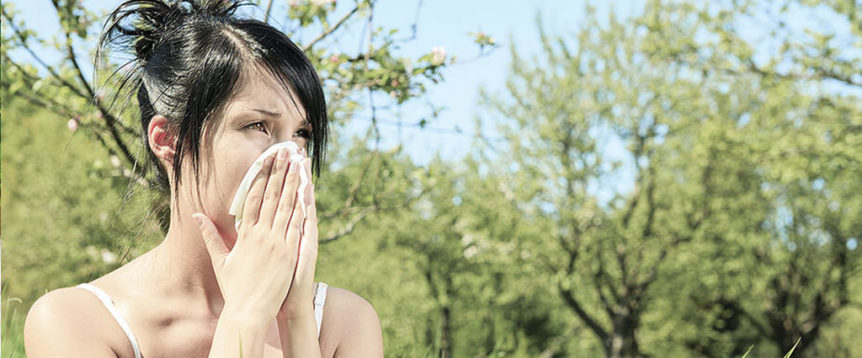Ah, springtime, when trees are budding, grasses are growing, flowers are blooming—and pollen is plentiful. For many, allergy season has arrived, bringing with it an onslaught of sniffling and sneezing. An ever-increasing number of people are affected: Up to 30 percent of the population now experience seasonal allergies, according to the American College of Allergy, Asthma & Immunology.
What to do? Building a strong allergy-proof foundation starts with caring for the body as a whole by eating well, exercising and handling stress, says Jonathan Psenka, N.D., author of Dr. Psenka’s Seasonal Allergy Solution (Rodale, 2015). Experts agree it’s also crucial to pay special attention to the immune system.
When allergies strike, the body is overreacting to something that is otherwise harmless because the immune system is stressed or lacking in certain nutrients. If you can get the immune system more in balance, you have a better chance of dealing with irritating allergens, says Jeanne Galloway, N.D., member of the American Association of Naturopathic Physicians. This involves replenishing nutrients that the body can’t make, that we can’t get enough of from food, and that may be depleted from stress and exposure to toxins.
Although conventional allergy medication can offer some relief, the following natural supplements both relieve symptoms and support the whole body.
Vitamins C and D
Vitamin C, a natural antihistamine, and vitamin D work at the cellular level, replenishing and repairing cells in the upper respiratory system and knitting together tissues, allowing them to do their jobs better, says Galloway. Although the jury is still out on vitamin D for treating allergies, there are many studies linking deficiency with allergies and asthma; one, from 2012, found that the prevalence of vitamin D deficiency was significantly higher in people with hay fever than others (30 percent versus 5.1 percent).
Dose: 500 mg vitamin C two to three times per day, suggests Psenka, starting one or two weeks before allergy season begins. Ask your doctor to test your vitamin D levels. If you are deficient, supplement with as much as 4,000–5,000 IU vitamin D daily. (Without testing, aim for 1,000 IU a day.)
Omega-3 Fatty Acids
Experts agree that while omega-3s are widely known for their use in heart health and even brain health, their anti-inflammatory properties also damp down the pathway that causes allergies, which are essentially an inflammatory reaction. Studies show a link between the ever-decreasing intake of fish oil (which is rich in omega-3s) in our diets and an increase in allergies and asthma.
Dose: Galloway suggests taking a product with a two-to-one ratio of EPA to DHA (two of the most common omega-3 fatty acids), up to a total of 1,000–3,000 mg daily, if no contraindications with other medications are present (ask your doctor to be sure).
Probiotics
Experts are enthusiastic about probiotics for seasonal allergies for the full-body connection. Probiotics balance good bacteria in the gut—where the majority of the immune system is housed—reduce inflammation in the gut and also inhibit inflammatory chemicals involved in allergic responses. Stated simply: If your digestive tract is out of balance, it is impossible to improve your allergy symptoms, says Galloway. A 2015 review in the American Journal of Rhinology & Allergy showed that probiotics significantly improved quality of life and nasal symptoms in people with allergic rhinitis (hay fever).
Dose: Take 1 billion CFUs, up to as high as 225 billion CFUs daily, varying by individual, for allergy support. Galloway recommends talking to your natural medicine provider about what’s best for you.
Quercetin
One of the best natural antihistamines, say the experts, quercetin reduces inflammatory symptoms in the airways on contact. During an allergic reaction, mast cells, a type of white blood cell first called to the scene of inflammation, burst and release histamine, an allergic compound. Working in a similar way to Benadryl, quercetin inhibits this process, reducing mucus, itchiness and swelling in the sinuses, says Galloway.
Dose: Available in powder, capsules and tincture; Galloway recommends taking 600–800 mg a day.
Stinging Nettle
Shown in test-tube studies to reduce inflammation, stinging nettle (also simply known as nettle) is another powerful histamine blocker, Galloway says. Derived from a plant that can actually sting and cause discomfort on contact, nettle is available in capsules or as a tea. This is a good one to sip on: “I have some patients that only need a few cups of [nettle] tea and their symptoms are markedly reduced,” says Carrie Demers, M.D., a holistic physician and medical director of PureRejuv Wellness Center in Pennsylvania.
Dose: 300 mg 1–3 times daily, recommends Demers. Steep a tea bag (or a teaspoon of dry herb) in hot water for 5–10 minutes.

